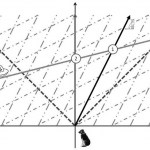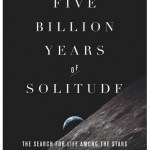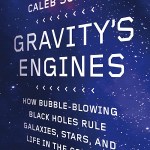Space
I enjoyed Caleb Scharf's previous book, Gravity's Engines a good deal, so I was happy to get email from a publicist offering me his latest. I'm a little afraid that my extreme distraction of late hasn't really treated it fairly, but then again, the fact that I finished it at all in my current state of frazzlement may be the best testament I can offer to its quality. This is a sweeping survey of what we've learned about our place in the universe over the last five hundred years or so.
Now, a grandiose description like that often portends a bunch of wifty philosophizing that poses grand…
I've gotten a few queries about this "Impossible space drive" thing that has space enthusiasts all a-twitter. This supposedly generates thrust through the interaction of an RF cavity with a "quantum vacuum virtual plasma," which is certainly a collection of four words that turn up in physics papers. An experiment at a NASA lab has apparently tested a couple of these gadgets, and claimed to see thrust being produced. Which has a lot of people booking tickets on the Mars mission that this supposedly enables.
Most physicists I know have reacted to this with some linear combination of "heavy sigh…
I didn't plan to do a follow-up to yesterday's post about the optics of sending messages with lasers, but then I starting idly thinking about detection, prompted in part by a bunch of conversations with my summer students about single-photon detectors. which led to scribbling on the back of an envelope, which led to Googling, and suddenly, I have a follow-up post.
So: as we said yesterday, if you want to send messages over a distance of ten light years, a relatively efficient way to do this might be to send them via lasers. This results in the light being spread over a pretty big area, though…
I've seen a bunch of people linking approvingly to this piece about the "Fermi paradox," (the question of why we haven't seen any evidence of other advanced civilizations) and I can't quite understand why. The author expends a good deal of snark taking astronomers and physicists to task for constructing elaborate solutions to Fermi paradox on the basis of shoddy and unjustified assumptions. And then proceeds to offer a different solution for the Fermi paradox based on shoddy and unjustified assumptions. Whee!
I mean, there is an element of this that's useful, namely the reminder that "We…
Last week's talks were using sci-fi space travel as a hook to talk about relativity, and my original idea for the talk was to explain how faster-than-light travel ultimately ends up violating causality. Some observers will see effects happening before the events that cause them, and that's just weird. In How to Teach Relativity to Your Dog, the illustration I use is a stationary dog watching a cat moving by at half the speed of light and a space alien zipping past at four times the speed of light. In that scenario, the dog can hand a water balloon to the passing alien to soak the cat, and…
It's taken me a disgracefully long time to finish the review copy of Lee Billings's Five Billion Years of Solitude I was sent back in the fall, mostly because I didn't read anything not immediately related to the book-in-progress for most of November and all of December. Which is to say, the long delay is not in any way a reflection of the quality of this book, which is excellent.
The title comes from the observation that the span from when life arose on Earth to the distant future when the expanding Sun will swallow the planet entirely is around five billion years. The span when the planet…
The last week or so of silence on the blog has been due to my trip to Ohio (which was very enjoyable), and a lack of child care for the early part of this week. A day and a half home with both kids was just exhausting, but the trip was useful in that it provided me time to read Gravity's Engines by Caleb Scharf, on the plane to and from Columbus (I got the paper edition at Science Online, and figured as long as I had a printed book I wanted to read, I might as well dodge the stupid argument about whether my Nook is likely to interfere with the plane's navigation systems).
This book comes with…
One final thought on the Big Science/ Space Chronicles stuff from last week. One of the things I found really frustrating about the book, and the whole argument that we ought to be sinking lots of money into manned space missions is that the terms of the argument are so nebulous. This is most obvious when Tyson or other space advocates talk about the need for "inspiring" people, but it shows up even in what ought to be relatively concrete discussions of actual science.
Take, for example, the argument over humans vs. robots. Given the success of the robotic missions to Mars and other bodies,…
I was tremendously disappointed and frustrated by this book.
This is largely my own fault, because I went into it expecting it to be something it's not. Had I read the description more carefully, I might not have had such a strong negative reaction (which was exacerbated by some outside stress when I first started reading it, so I put it aside for a few weeks, until I was less mad in general, and more likely to give it a fair reading). I'm actually somewhat hesitant to write this up at all, for a number of reasons, but after thinking it over a bit, I think I have sensible reasons for being…
A week or so ago, lots of people were linking to this New York Review of Books article by Steven Weinberg on "The Crisis of Big Science," looking back over the last few decades of, well, big science. It's somewhat dejected survey of whopping huge experiments, and the increasing difficulty of getting them funded, including a good deal of bitterness over the cancellation of the Superconducting Supercollider almost twenty years ago. This isn't particularly new for Weinberg-- back at the APS's Centennial Meeting in Atlanta in 1999, he gave a big lecture where he spent a bunch of time fulminating…
I'm about a week late talking about this, but I've mostly resigned myself to not doing really topical blogging these days. Anyway, there was a lot of excitement last week over the announcement that an all-star team of nerd billionaires is planning to do commercial asteroid mining. (The post title is a reference to the Sean Connery movie, not the post-Bloom County comic.) I find it kind of amusing that this made the news while I'm doing retrospective blog posts (the next of which is coming), which have turned up a bunch of old posts where I say skeptical things about space in general. So I…
While reading bits of Neil deGrasse Tyson's Space Chronicles yesterday, I ran across this quote, attributed to "an Assyrian clay tablet from 2800 BC":
Our Earth is degenerate in these later days; there are signs that the world is speedily coming to an end; bribery and corruption are common; children no longer obey their parents; every man wants to write a book and the end of the world is evidently approaching.
This made me scratch my head for a couple of reasons. I've seen this quote before, but always attributed to Cicero, which sorta-kinda makes sense. Seeing it moved back in time by a few…
The final Space Shuttle landed the other day, leading to much lamentation over the end of the program, all over the Internet. It was absolutely choking my Twitter feeds for a while, which is mostly what I was thinking about when I re-tweeted this snide comment from Robert Lamb (though, to be fair, most of the people choking my Twitter feeds with Shuttle-related comments are space obsessives anyway, so it's not that new). I got a little grief for that over in locked LiveJournal land, so I thought I might as well say a bit more about it here.
While there is some part of me that feels a little…
As I have admitted previously, I have a fondness for tv shows about UFO's, the loonier the better. So, when I learned that there was a show called When Aliens Attack airing last night on the National Geographic channel, I was all over that. I'm happy to report that it did not disappoint-- it brought the crazy, in exactly the manner I was hoping for.
The premise of the show is a look at what would happen if aliens turned up on Earth, and turned out to be hostile. It claims to be a look at military contingency plans for dealing with an alien invasion, though the "plans" in question seem to be…
It's the last week of the (calendar) year, which means it's a good time to recap the previous twelve months worth of scientific news. Typically, publications like Physics World will publish a list of top ten physics stories of 2010, but we're all Web 2.0 these days, so it seems more appropriate to put this to a poll:
What is the top physics story of 2010?survey software
I've used the Physics World list as a starting point, because you have to start somewhere. I added a few options to cover the possibility that they left something out, and, of course, you know where the comments are.
This…
We missed the formal presentaion at the World Science Festival stargazing event last night, and it was cloudy enough to prevent actual stargazing, but the giant mock-up of the James Webb Space Telescope is giant and cool even in the dark. More importantly, Neil deGrasse Tyson is awesome. We got there around 9:30, and he was taking questions from an informal group of people having around where the presentation had been. When we left at 11pm, he was still going strong. More amazingly, I don't recall seeing him drink anything.
He may be a robot. A really awesome robot who is amazingly generous…
While I missed the controversial episode with comments about aliens, I figured I should at least take a look at the Discovery Channel's Into the Universe with Stephen Hawking, so I put it on last night after putting SteelyKid to bed. This was the big two-hour "Story of Everything" episode, starting with the Big Bang and describing the whole history of the universe.
I made it through about half an hour, before I gave up and went to bed. This was partly due to it being a really long day (I took SteelyKid shopping and to a playground, did some yard work, and went to a meeting on campus), so I…
Voting has closed on the Laser Smackdown poll, with 772 people recording their opinion on the most amazing of the many things that have been done with lasers in the fifty years since the invention of the first working laser (see the Laserfest web site for more on the history and applications of lasers). The candidates in the traditional suspense-building reverse order:
Lunar laser ranging 22 votes
Cat toy/ dog toy/ laser light show 41 votes
Laser guide stars/ adaptive optics 46 votes
Holography 47 votes
Laser eye surgery 53 votes
Optical storage media (CD/DVD/Blu-Ray) 60 votes
Laser…
I'm a little surprised at the vehemence of some of the negative reactions to Stephen Hawking's comments about aliens. Not so much in blogdom-- Ethan's response is pretty reasonable, for example-- but there was a flurry of Twitter traffic yesterday of the form "Where does Stephen Hawking get off pontificating about aliens?" which strikes me as kind of silly.
As all the news stories point out, Hawking's comments were made in the context of a Discovery channel series based on filming Stephen Hawking pontificating about stuff. And, really, if the Discovery Channel called me up and offered to film…
As of 1:45 Monday, 217 people have cast votes in the Laser Smackdown poll. That's not bad, but it's currently being handily beaten by the 271 people who have voted for a favorite system of units.
The nice thing about using actual poll services for this sort of thing, though, is that I can re-post the poll to boost signal a little. So, here it is again, a list of the twelve most amazing laser applications suggested by my wise and worldly readers, with links to short explanations of the pros and cons of each:
Which of the following is the most amazing application of a laser?Market Research…





